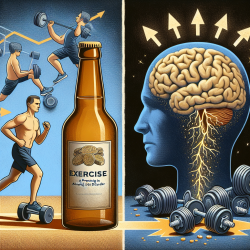Introduction
Alcohol Use Disorder (AUD) is a pervasive issue, affecting millions worldwide. Traditional treatments often include pharmacological and behavioral therapies, but relapse rates remain high. Recent research highlights the potential of aerobic exercise as an adjunctive therapy, particularly through its effects on N-methyl-D-aspartate (NMDA) glutamate receptors, which play a crucial role in brain function and addiction mechanisms.
The Science Behind NMDA Receptors
NMDA receptors are integral to synaptic plasticity and memory function. Alcohol consumption disrupts these receptors, leading to neuroadaptive changes that contribute to addiction. Acute alcohol exposure inhibits NMDA receptor function, while chronic exposure can increase receptor subunit levels, altering synaptic transmission. During withdrawal, increased NMDA receptor expression may lead to hyperexcitability, contributing to withdrawal symptoms.
Exercise and NMDA Receptor Modulation
Aerobic exercise has been shown to positively influence NMDA receptor function, potentially counteracting the negative effects of alcohol on these receptors. Exercise enhances brain plasticity and increases brain-derived neurotrophic factor (BDNF) levels, which support cognitive function and neurogenesis. Studies suggest that exercise can modulate NMDA receptor subunit composition, offering a non-pharmacological approach to mitigating AUD symptoms.
Implications for Therapeutic Strategies
The integration of exercise into AUD treatment protocols could offer several benefits:
- Neurobiological Benefits: Exercise-induced neurogenesis and enhanced synaptic plasticity may improve cognitive function and reduce alcohol dependency.
- Psychological Benefits: Exercise can improve mood and self-efficacy, crucial for recovery and relapse prevention.
- Physiological Benefits: Regular physical activity enhances overall health, reducing the risk of comorbid conditions.
Conclusion
While more research is needed to fully understand the mechanisms by which exercise affects NMDA receptors and AUD, current evidence suggests that aerobic exercise could serve as a valuable adjunctive therapy. By enhancing brain function and reducing the impact of alcohol on NMDA receptors, exercise offers a promising avenue for improving treatment outcomes for individuals with AUD.
To read the original research paper, please follow this link: Potential Link Between Exercise and N-Methyl-D-Aspartate Glutamate Receptors in Alcohol Use Disorder: Implications for Therapeutic Strategies.










